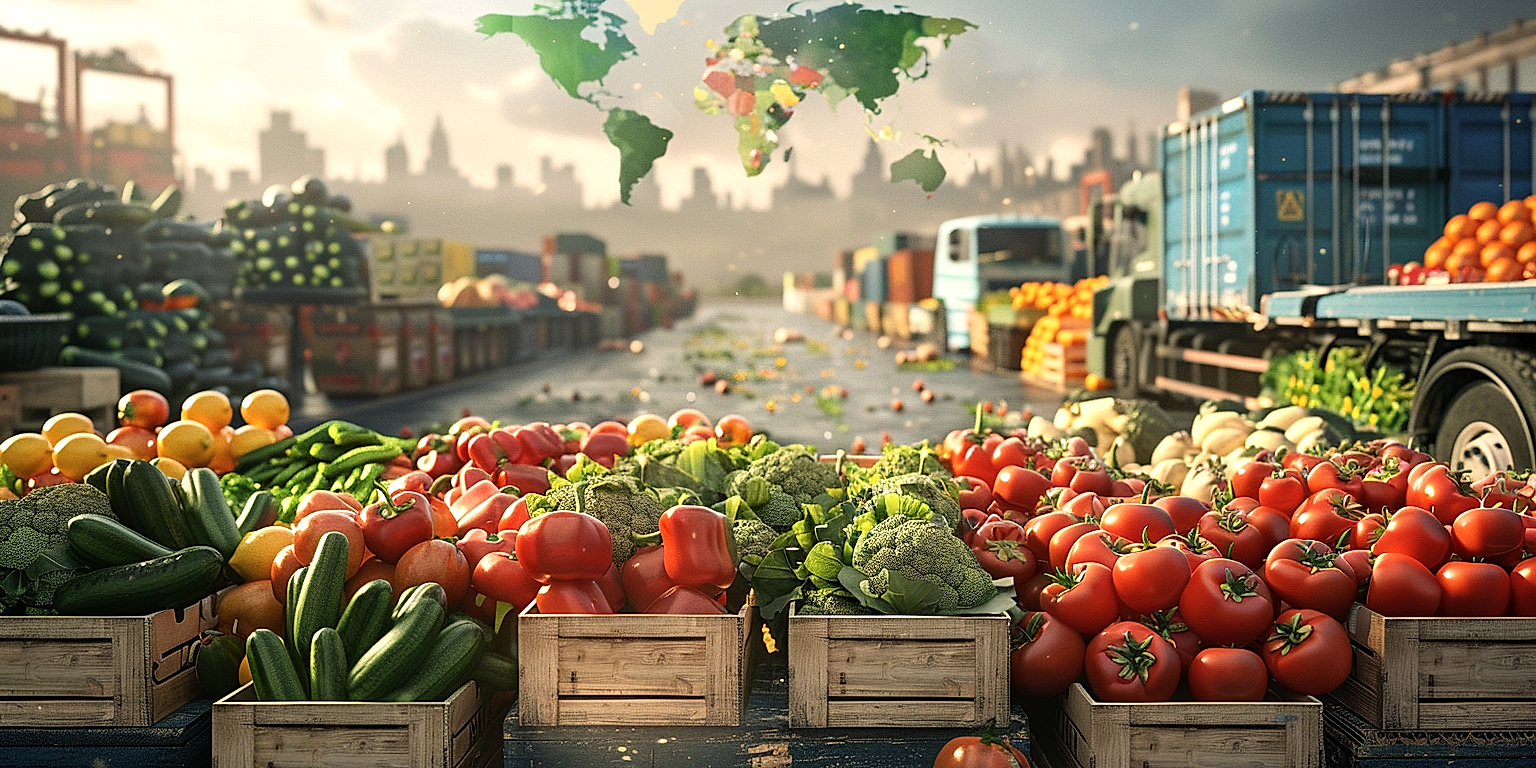The ambition to scale a company and drive growth is at the heart of every business owner.
When it comes to the produce shipping industry, expanding your operations beyond geographical boundaries can be a rewarding yet challenging venture.
It offers an opportunity to tap into new markets, increase profits, and build a global customer base.
However, success in this realm requires a strategic approach, informed decisions, and comprehensive understanding of international logistics.
This unique endeavor demands familiarity with diverse business cultures, regulatory environments, and transportation infrastructure.
Implementing proven tactics can further optimize and streamline the process of taking your produce shipping business to the global stage.
Contents
- Tips For Expanding Your Produce Shipping Business Globally
- 1. Identify target markets for your produce.
- 2. Ensure Quality Packaging for International Shipping
- 3. Understand international import/export regulations.
- 4. Form partnerships with reliable freight companies
- 5. Maintain Top-Quality, Fresh Produce.
- 6. Offer competitive pricing for bulk orders
- 7. Invest in a trustworthy customs broker.
- 8. Secure Necessary Export Certifications and Licenses
- 9. Utilize technology for efficient inventory management
- 10. Cultivate strong relationships with international buyers.
- The Bottom Line
Tips For Expanding Your Produce Shipping Business Globally
1. Identify target markets for your produce.
When looking to expand your produce shipping business globally, it’s essential to identify your target markets first.
Determining the countries or geographical areas where your produce will be most in demand is a foundational step to formulating an effective globalization strategy.
You might want to consider certain factors like local food preferences, dietary habits, and cultural significance attached to certain types of produce.
Moreover, it’s not only about where the demand is high but also about whether or not you can offer competitive prices in those markets.
Keep in mind that the cost of logistics and tariffs can significantly increase the final price of your produce in the target market.
Conducting a thorough market analysis can help you identify viable target markets for expanding your produce shipping business globally.
Researching potential markets requires dedicated time and resources to gain a nuanced understanding of the commercial and cultural nuances of the respective countries.
The analysis should also include an assessment of the existing competition in those markets and the unique selling propositions of their offerings.
Market trends, growth rates, and customer purchasing behaviors are further aspects of the market to look into while pinpointing your target market.
Another good strategy is to start small and expand gradually. Begin with a select few readily-accessible and profitable markets and then diversify as your global presence strengthens.
A long-term perspective is also important. Some markets might not be very lucrative right away, but due to changing trends and economic development, could hold great potential in the future.
Having a clear understanding of who your customers are and what they want is crucial.
By understanding their needs, you can ensure that your produce offers the best value proposition in those markets.
Furthermore, carefully vetting potential markets aids in an effective risk mitigation strategy, preventing costly market entry missteps.
Remember, successful global expansion isn’t solely about capitalizing on opportunities, it’s also about managing potential challenges effectively.
In essence, identifying and understanding your target markets paves the way for a smooth, productive global expansion of your produce shipping business.
2. Ensure Quality Packaging for International Shipping
As you venture into global expansion, one of the key factors to consider is how to ensure quality packaging for international shipping.
An obvious starting point is to carefully choose packaging materials designed to protect the produce throughout the shipping process.
For instance, you could consider using insulated shipping boxes that maintain an optimal environment for the produce, minimizing spoilage.
Additionally, incorporating protective inner packaging, such as bubble wrap or foam peanuts, can provide an extra layer of protection against rough handling during transit.
Remember, adequately sealing and securing the package is another crucial factor in preventing damage, contamination, or the loss of products.
Consider factors like the size and weight of the packaging – these not only impact shipping costs but could also affect the handling and storage of items at the destination.
Be mindful of the legal requirements and standards for packaging in your target markets. This could include everything from labelling regulations to the types of materials permitted.
For example, some countries may have restrictions on the use of certain plastic materials, requiring shippers to use biodegradable or recyclable alternatives.
In addition, pay attention to the physical conditions the produce might face during shipment.
Fruits and vegetables, for example, might have to withstand dramatic changes in temperatures during transit, so ensuring temperature-controlled packaging could be crucial.
Furthermore, you could review the packaging strategies used by other businesses in your industry, or consult with a packaging expert to guide you through the best practices.
Every element of your packaging, from the materials to the design, should reflect the quality and value of your produce.
Remember, the packaging is often the first physical interaction a customer has with your product, so it can significantly impact their overall impression and satisfaction.
Beyond the practical considerations, your packaging also presents an opportunity to enhance your brand image with attractive and informative design.
While all these factors are essential, it’s crucial to remember that quality packaging doesn’t have to equate to high costs.
By evaluating your options carefully and prioritizing both protection and efficiency, you can develop a packaging strategy that meets the needs of your business and your international customers.
3. Understand international import/export regulations.
One of the crucial steps in expanding your produce shipping business globally is to understand international import/export regulations thoroughly.
Bearing in mind that these regulations vary from country to country, detailed research is critical.
These regulations dictate the legal aspects of international trade such as customs declarations, documentation, product standards, and even quarantine and inspection requirements.
You must ensure your exported produce complies with the laws of your target market to avoid any disruption in your shipping business.
It is essential to grasp the scope of these laws fully, considering that non-compliance could lead to significant penalties or even suspension of your license.
For instance, certain countries may restrict the importation of organically grown produce without a certain certification
Similarly, some regulate the chemical residue levels in the produce and require special testing before importation.
Documentation plays an equally vital role in import/export, with several documents like commercial invoices, bills of landing, and certificates of origin being necessary.
These documents validate the legality of the transaction and help in tracking the movement of goods across borders.
Even though it may seem overwhelming, several resources could help simplify the process for you.
You can turn to government trade agencies, import/export consultants, and online resources like trade portals for necessary guidance on these regulations.
Getting to understand international import/export regulations will not only shield your business from legal pitfalls but also set you on a path to successful global expansion
Attending trade seminars and industry-related forums can also offer insightful perspectives and keep you updated on any changes in these regulations.
Moreover, building relationships with experienced players in the industry can also provide support and give you the confidence to navigate the international trade scene.
Remember, regular reviews of the regulations of your target markets are crucial since these laws could change and affect your business model.
4. Form partnerships with reliable freight companies
The first step to forming partnerships with reliable freight companies is to determine your specific shipping needs.
Elements such as the produce type, size of the orders, frequency, and desired speed of delivery, as well as the geographical areas you wish to cover, are key considerations.
Knowing these requirements will help sift through potential freight companies, identifying those which are most suitable for your operations.
Once potential partners have been identified, it is crucial to research each one in-depth, considering their reputation, reliability and service quality.
A company with a proven track record in international shipping, specifically in the transportation of perishable goods, would be highly beneficial.
Partnering up with freight companies which have extensive knowledge and experience in handling complex shipping regulations and requirements of different countries will be invaluable for your business.
It might also be beneficial to find out whether these potential partners offer any additional services such as customs brokerage, insurance, or other legal assistance.
These would further smoothen your transition onto the international stage, reducing potential operational burdens.
Setting up meetings with these freight companies is also important – cultivating a good business relationship leads to better communication and smoother operations.
When negotiating contract terms, securing flexible agreements which take into consideration the potential for changes in your shipping needs is key.
Additionally, it is also important to ensure that prices are competitive and commensurate with the service provided.
You should also have a contingency plan in place in case your chosen freight company is unable to fulfil a shipment.
Such a plan could include having backup freight companies or different modes of transportation options that are ready to step in at a moment’s notice.
Lastly, it might be beneficial to constantly re-evaluate and renegotiate your partnership terms to ensure they remain beneficial for your business.
Forming partnerships with reliable freight companies is a significant, but necessary step to ensuring successful international expansion of your produce shipping business.
5. Maintain Top-Quality, Fresh Produce.
The global expansion of your produce shipping business relies substantially on your ability to maintain top-quality, fresh produce.
Striving for superior quality is crucial in differentiating your products from the multitude of competitors in the international market.
Maintaining freshness in your produce significantly affects its flavor, texture, and nutritional value, subsequently influencing consumer’s preference and demand for your products.
Producing and shipping low-quality or stale produce is a guaranteed way to lose customers and damage your brand’s reputation on a global scale.
Remember, in the business of produce shipping, your product’s quality and freshness equate to the overall satisfaction of your customers, directly affecting your global market share.
As a result, you need to invest in advanced farming techniques and robust quality control measures to ensure your produce is top-quality and fresh.
These techniques might include hydroponics, greenhouse technologies, or organic farming methods that promote the growth of high-quality produce.
Additionally, implementing strict quality control measures at every stage, from planting to harvesting and packaging, can help to maintain the quality and freshness of your produce.
An example is the use of proper refrigeration methods during storage and transportation to keep the produce fresh for extended periods.
The use of packaging technologies that enhance shelf-life and preserve quality, such as modified atmosphere packaging, are also paramount in maintaining produce’s freshness.
Remember, you’re not just competing with domestic businesses, but on a global scale with international standards. So, maintaining top-quality, fresh produce cannot be overemphasized.
Taking the time to listen to customer feedback can also provide you with crucial insights about the perceived quality and freshness of your produce.
Reliable feedback from customers and partners can guide improvements in your production and shipping processes to further heighten the quality and freshness of your products.
Moreover, it’s essential to provide your staff with a thorough understanding of the importance of maintaining the quality and freshness of your products. After all, the overall quality of your produce is a collective representation of the hard work and dedication of your staff.
Every member of your team should be clear on the end goal: deliver fresh, top-quality produce that meets or exceeds international standards.
6. Offer competitive pricing for bulk orders
In the ever-competitive world of international produce shipping, it’s crucial for businesses to offer competitive pricing, particularly for bulk orders.
This approach not only encourages buyers to make larger purchases, it also enhances your business’s market appeal and helps attract a wider range of customers.
Establishing a pricing strategy, particularly for bulk orders, is no simple task and requires consideration of several factors.
First, understanding your cost of production and operation is vital, as this forms the basis of your pricing.
Second, knowing your customers and their price sensitivity and demand are key to setting competitive prices that they are willing to pay.
Third, being aware of your competitors’ prices can provide a benchmark, helping you competitively price your produce without undercutting your profits.
A balanced approach to pricing, fervently keeping in mind your cost, customer demand, and the competitive landscape, is a fundamental step in expanding your produce shipping business globally.
Offering discounts on bulk orders is another strategy to entice customers to buy more.
It’s a common practice that not only increases the volume of sales but also fosters a bond of loyalty with your customers.
However, while implementing bulk pricing, it’s critical to ensure the discount does not significantly erode your profit margins.
Additionally, it’s important to clearly communicate your pricing policies and bulk discounts to potential customers, using effective marketing strategies.
Making use of digital technologies like eCommerce platforms can also facilitate the display and promotion of your pricing policies and discounts, reaching a wider audience.
Clearly, offering competitive pricing for bulk orders isn’t just about reducing the unit price.
It’s about strategically aligning your prices with your business goals, understanding your market and customers, and leveraging marketing and technology to effectively promote your offerings.
Through careful planning and execution, this approach can significantly contribute to the expansion and success of your global produce shipping business.
7. Invest in a trustworthy customs broker.
When seeking to expand your produce shipping business globally, one significant factor to consider is investing in a trustworthy customs broker.
A customs broker is a professional who specializes in navigating the complexities of international shipping regulations and procedures.
Their knowledge and expertise can prove to be invaluable in avoiding delays, additional costs, or potential legal issues that can occur when exporting products worldwide.
Therefore, the decision to invest in a good customs broker is a strategic move that can lead to the smooth expansion of your business globally.
Through their understanding of the intricacies of customs laws and regulations, a customs broker can help expedite the import and export process, ensuring that your produce reaches its destination on time.
A reliable customs broker can also minimize risks and uncertainties when shipping produce to different countries. As the global marketplace is constantly changing, it can be a challenge to stay updated with evolving international trade rules and tariffs.
Having a dedicated customs broker means you have someone on your team who can anticipate these changes and help guide your actions accordingly.
Your customs broker can be your first line of defense against unwanted surprises, such as sudden changes in tariffs or trade regulations, which could negatively impact your shipping costs and ultimately, your bottom line.
Furthermore, an experienced customs broker can also provide you with valuable insights regarding new markets and opportunities for business expansion.
They can assess the demands and requirements of different regions, identifying potential challenges and opportunities, which can aid your business in making informed decisions for future growth and expansions.
Besides handling your import and export procedures, a reliable customs broker can also ensure compliance with food safety regulations in different countries.
This is essential for any produce shipping business considering the strict quality and safety standards of food products across various regions. Importantly, non-compliance with these regulations could lead to heavy penalties or ruined business relationships.
Therefore, the cost of investing in a trustworthy customs broker should always be viewed as an aspect of your broader business strategy, as opposed to just an additional expense. It’s an investment that promises to facilitate your global shipping operations, minimize risks, and contribute to the overall successful expansion of your produce shipping business globally.
For these reasons outlined above, it’s clear to see why investing in a trustworthy customs broker is an essential step for any produce shipping business looking to grow and expand its operations on a global scale.
Remember, owing to the risks and complexities involved, international shipping should not be approached lightly— you’ve got produce to deliver, and your reputation to uphold with every shipment that leaves your warehouse. Entrust this crucial aspect to a reliable and experienced customs broker, and ensure that your business is well-equipped to thrive and succeed in the global marketplace.
8. Secure Necessary Export Certifications and Licenses
When planning to expand your produce shipping business globally, securing the necessary export certifications and licenses is mandatory.
This process begins with understanding what types of certificates and licenses are required for the countries you wish to export your produce to.
Each country has its own regulations and standards that must be met, and your ability to effectively meet these standards is paramount to your success.
The necessary license and certifications not only ensure legal compliance, but they also serve as a testament to the quality and safety of your produce.
Accreditation bodies such as the United States Department of Agriculture (USDA) or the European Food Safety Authority (EFSA) are among the international organizations that provide export certifications.
Investing the appropriate time and resources to obtain these certifications demonstrates your commitment to delivering high-quality, safe produce.
Many countries have stringent rules and regulations for importing agricultural produce to safeguard their domestic industries and public health from potential risks.
Thus, these certifications are not merely bureaucratic hurdles, they represent an understanding and acknowledgement of the international produce standards.
If you skip this step, you expose your business to the risk of noncompliance penalties and even potential blacklisting.
You can do this process yourself or hire an expert such as a customs broker or a regulatory consultant to ensure that all your documents are in order.
Either way, it is important that you verify every certification and license you secure, as any missed detail could see your shipment halted or rejected.
The costs of ensuring compliance may seem burdensome, but they are far less than the potential costs of noncompliance.
Thus, obtaining all necessary export certifications and licenses shouldn’t be seen as an option but as a necessity.
Beyond financial costs, noncompliance risks damaging the reputation of your business and eroding the trust of your international buyers.
Remember, shipping globally isn’t just about establishing connections, you also need to uphold the integrity of your produce, which is evidently expressed through the certifications and licenses you secure.
Ultimately, the legitimacy and growth of your business on the international stage hinge on these critical certifications and licenses.
9. Utilize technology for efficient inventory management
The advent of technology has made inventory management more efficient and less cumbersome for businesses. Utilizing technology for inventory management when expanding your produce shipping business globally is a move that cannot be overstated.
This is because it not only reduces the manual labor involved but also increases accuracy and productivity, making your business operations more efficient.
A crucial aspect of technology in inventory management is the use of software applications. The use of inventory management software eases the task of tracking and managing inventory levels, orders, sales, and deliveries in real time.
Advanced software can also track the history of your produce, providing traceability which is a critical feature for a global produce shipping business.
The implementation of technology on such a routine task like inventory management in your shipping produce business, allows not only the tracking of products at any given time, but it also enables forecasting demand, controlling the movement and storage of produce and prioritizing deliveries.
Automation of inventory also translates to strategic business insights.
An intelligent inventory management system can provide you with detailed reports on which produce sells best, peak selling times, which markets prefer specific produce, among other crucial data. This insight can significantly enhance your business strategy.
The use of technology in inventory management also reduces errors significantly. Mistakes in inventory control can lead to costly mishaps like produce loss due to overstocking, expired goods, incorrect shipping, among others. Using an efficient inventory management system helps to eliminate these preventable errors.
Moreover, technology reduces inventory costs. An automated inventory system ensures you have just the right amount of produce at any one time, avoiding wastage and saving significant costs.
Furthermore, with global shipping, having real-time inventory data is critical. Visibility of your inventory from sourcing, shipping, to the consumer is essential for successful global shipping operations.
One other key benefit of using technology for inventory management is improved customer service. An efficient inventory system ensures quick deliveries, accurate orders, and fewer out-of-stock instances, leading to improved customer satisfaction.
The use of barcode scanners, Radio Frequency Identification Devices (RFID), and smart labels are ways you can incorporate technology in your inventory management. These devices enhance the precision and speed of inventory control significantly. Investing in these technologies can give your business a competitive edge.
Therefore, it is evident that incorporating technology into your inventory management is a vital step in expanding your produce shipping business globally. This strategic move will provide your business with the necessary efficiency and accuracy required for successful global operations.
10. Cultivate strong relationships with international buyers.
Developing strong relationships with international buyers is an essential step in expanding your produce shipping business globally.
Doing so not only helps in increasing your product’s reach and visibility but also aids in understanding the specific demands and preferences of the international markets.
Building relationships with international buyers denote more than just transactions, it involves establishing trust and mutual understanding.
Nurturing a sense of reliability and assurance among your buyers can go a long way in helping your business grow.
Relationship building is not a transactional process, it involves constant engagement, understanding their needs, and providing personalized solutions.
Constant and clear communication forms the backbone of international buyer-seller relationships.
Digital platforms can significantly facilitate this by providing a medium for regular interaction and dialogue.
An understanding and respect for the cultural nuances of your buyers can also be instrumental in gaining their trust and appreciation.
Providing excellent customer service will not only retain your current buyers but also attract potential ones.
Investing time into building your international buyer relationships can lead to long-term contracts and agreements, thereby providing stability and potential growth for your business.
You should also be prepared to showcase flexibility and adaptability in the face of market changes and buyer preferences.
Careful and respectful negotiation strategies can prove to be beneficial in creating successful, reciprocal relationships.
In today’s digital world, attending international trade fairs, webinars, and networking events can provide opportunities for introducing your products to potential buyers and building beneficial relationships.
Embarking on joint promotions and collaborations with your buyers can also strengthen relationships and mutual business growth.
Building strong relationships with international buyers is not just a strategy, but an investment towards the sustainable growth of your global produce shipping business.
The Bottom Line
Ultimately, penetrating the global market as a produce exporter requires a multifaceted approach.
It’s about recognizing your target markets, ensuring the quality of your packaging, and staying current with international regulations.
The need for reliable freight partnerships, maintaining the freshness of your produce and providing competitive pricing can’t be understated.
Trustworthy relationships with customs brokers and the right export certifications further enhance your credibility and ability to operate smoothly.
Advancements in technology also offer opportunities for effective inventory management.
Most importantly, developing strong relationships with international buyers can guarantee repeat business and a solid reputation worldwide.




